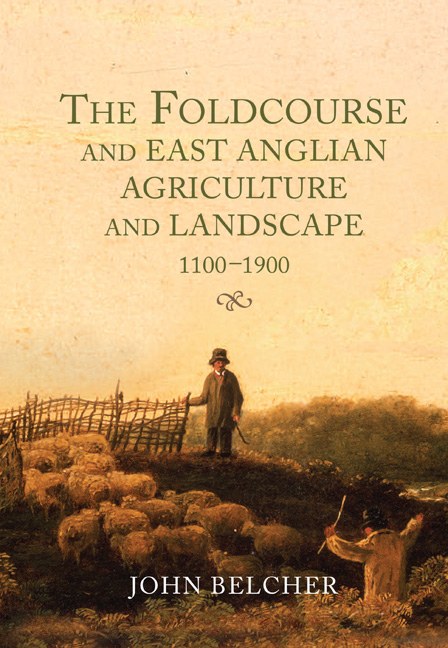Book contents
- Frontmatter
- Contents
- List of Illustrations
- Acknowledgements
- List of Abbreviations
- Introduction
- Chapter 1 The Contexts of the Foldcourse
- Chapter 2 Manors, Rights and Customs of the Foldcourse
- Chapter 3 The Medieval Foldcourse
- Chapter 4 The Late Medieval Evolution of Foldcourse Husbandry
- Chapter 5 The Agricultural Practice of Foldcourse Husbandry
- Chapter 6 The Foldcourse and Improvement
- Conclusions
- Glossary
- Bibliography
- Index
- Garden and Landscape History
Chapter 1 - The Contexts of the Foldcourse
Published online by Cambridge University Press: 26 March 2021
- Frontmatter
- Contents
- List of Illustrations
- Acknowledgements
- List of Abbreviations
- Introduction
- Chapter 1 The Contexts of the Foldcourse
- Chapter 2 Manors, Rights and Customs of the Foldcourse
- Chapter 3 The Medieval Foldcourse
- Chapter 4 The Late Medieval Evolution of Foldcourse Husbandry
- Chapter 5 The Agricultural Practice of Foldcourse Husbandry
- Chapter 6 The Foldcourse and Improvement
- Conclusions
- Glossary
- Bibliography
- Index
- Garden and Landscape History
Summary
The first modern description of the agrarian practice known as the foldcourse was provided by K. J. Allison, whose focus was primarily on the sixteenth century, a period that has been characterised as that of the “classic” foldcourse. It was, however, an institution with a long history – from the eleventh century and probably earlier, until the nineteenth century in some locations – and one that evolved over time. Furthermore, it followed no single pattern and one “should resist attempts to describe the foldcourse … as if it operated in some standardised form” across East Anglia. The title of Allison's article makes clear that he saw the foldcourse as a regional version of “sheep–corn husbandry”, thinking that the two terms were, as they applied to Norfolk at least, synonymous. Sheep–corn husbandry consisted, in essence, of a cycle whereby sheep were fed by day on hill pastures and heaths and by night were folded on the arable open fields in order to manure the latter. It was, in the medieval and early modern periods, one of the more extensive types of mixed farming – extensive both in its geographical distribution but also in its need for wide areas of pasture, Bruce Campbell describing it as “a particularly cost-effective method of maintaining the fertility of lighter soils” in need of regular manuring. As Joan Thirsk has pointed out, while sheep–corn husbandry is characterised as an arable regime, the critical element in this “elegantly neat system” for the maintenance and improvement of grain yields was the sheep fold. For Eric Kerridge, writing with characteristic force, the sheep fold was “the sheet anchor of husbandry”, in particular in the Chalk Country of Wiltshire and Hampshire.
The core elements of both sheep–corn and foldcourse husbandry were open fields and large flocks of sheep. The distinct difference between the two regimes lay in the role of the manor – or, as Alan Simpson expressed it, the “peculiarity” of the foldcourse is the position of the manorial lord, whereby only he or his lessee had the right to maintain a fold. Furthermore, all of a township's grazing was usually the prerogative of the manorial lord, irrespective of who was occupying the land, as a consequence of which the demesne flocks could feed on land of both the demesne and tenants.
- Type
- Chapter
- Information
- Publisher: Boydell & BrewerPrint publication year: 2020

